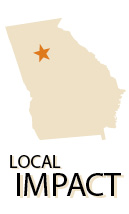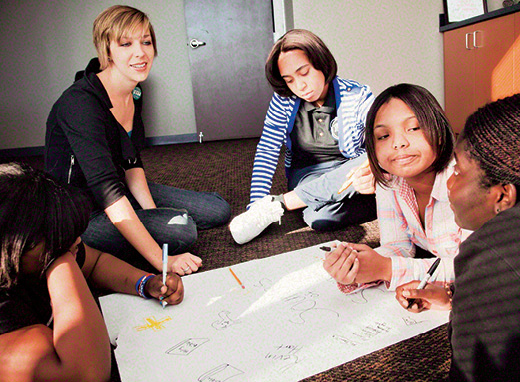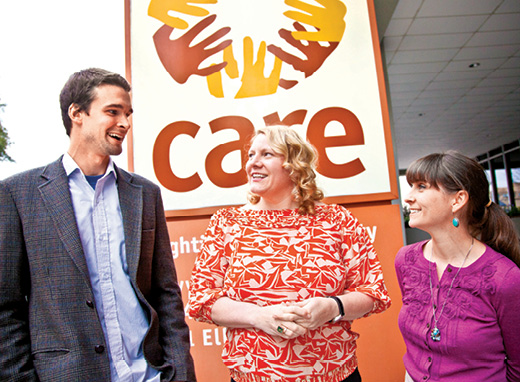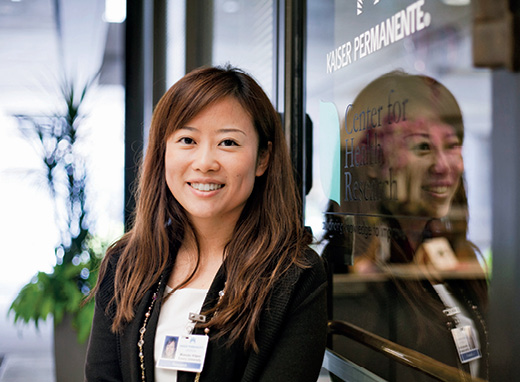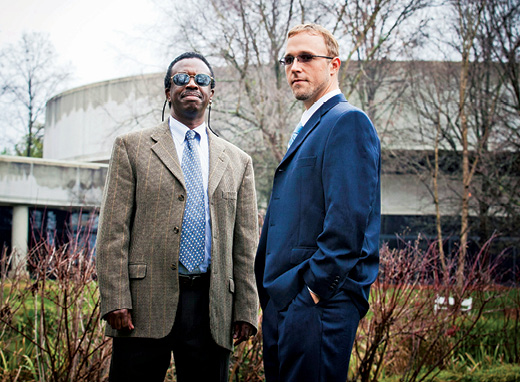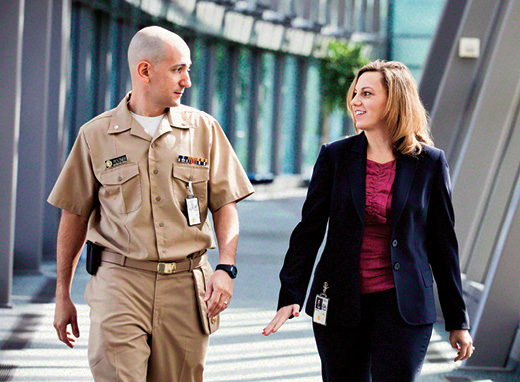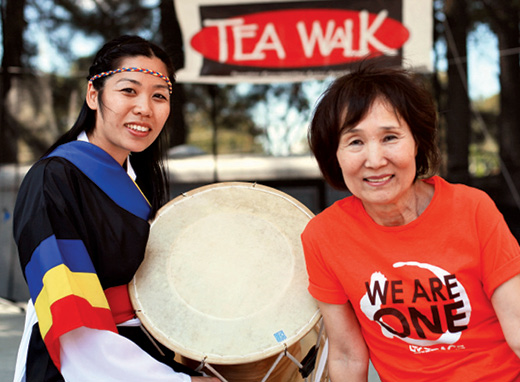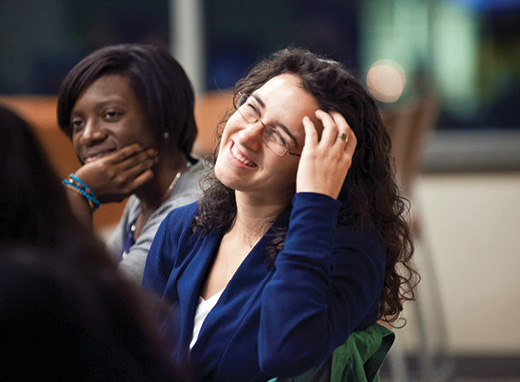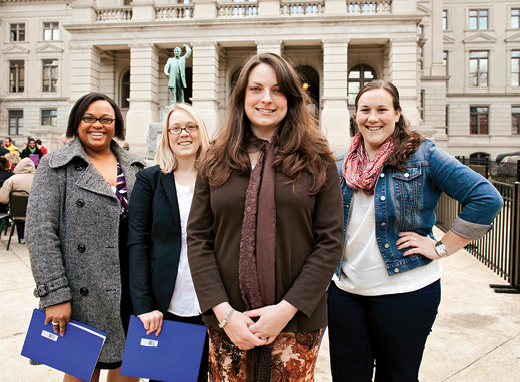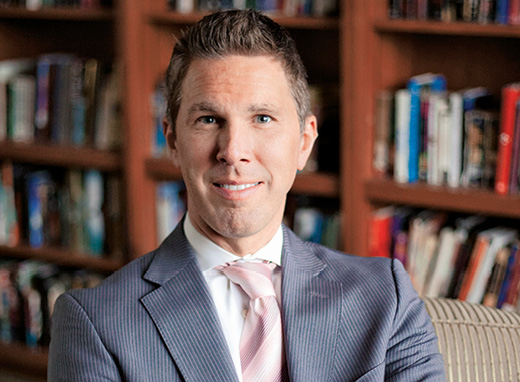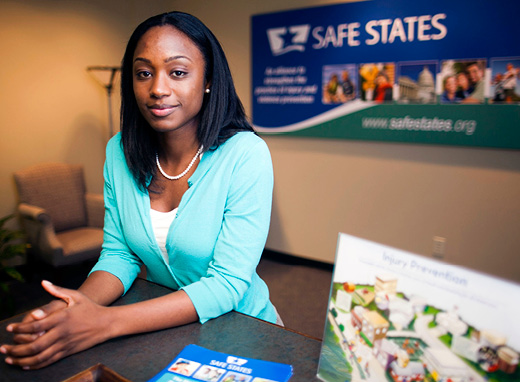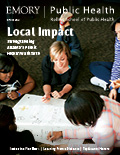Local Impact
Slideshow: 1.Alumna Meridith Rentz of MedShare. 2.Student Logan Kirsch with mentor Nancy Paris at Georgia CORE; 3.Alumna Lenette Golding (center) with students Bill MacWright and Alina Shaw at CARE (left). Student and Carter Center staff member Adam Weiss (right); 4.Samantha Collado, Kristen McLean, and Amanda Gurin, student interns with Mental Health America of Georgia; 5. Kate Huber, a Kaiser Permanente intern researching the Atlanta BeltLine.
Stories by Pam Auchmutey, Patrick Adams 09MPH, and Sylvia Wrobel
Strengthening Atlanta's public health workforce
In his first year at Rollins, Logan Kirsch 13MPH has already made an indelible mark on Georgia. Kirsch provided the skills and man-hours to launch a new website for Georgia CORE (Center for Oncology Research and Education). It is the state’s first comprehensive cancer information website, designed to support the agency’s mission of improving cancer care quality through research and education.
Nancy Paris, president of Georgia CORE and a member of the RSPH Dean’s Council, has worked with a number of Rollins students. In search of someone to help develop the website, she gave her wish list to the school’s Office of Career Services.
Paris didn’t have long to wait. “Here comes Logan, who had established a nonprofit to support young adult cancer patients after a friend was diagnosed with cancer in his teens,” says Paris. “He was exactly the kind of person we need. He is committed to addressing cancer-related issues and recognizes the value of research.”
Atlanta health agencies often rely on Rollins students to fill their staffing needs. Kirsch is one of more than 400 students hired through the RSPH Practical Experience Program, which matches students with paid work opportunities at local nonprofit agencies and businesses and also at Emory and CDC. Through these partners, students gain valuable experience, often from alumni leaders in the Atlanta workforce.
Students offer much in return by sharing their knowledge and skills with agencies that often lack the human resources they need to accomplish their goals. Just as important, students serve the community by promoting health in different ways.
Kirsch came to Rollins after graduating from the University of Michigan to pursue his interests in science, medicine, and social justice. The school’s emphasis on community engagement was of prime interest.
Before starting class last fall, Kirsch joined new and returning students for Rollinsteer Day, an annual day of service in Atlanta. He volunteered at Covenant House Georgia, which provides shelter and services for homeless and runaway youth.
“It was a great day from the beginning,” says Kirsch. “It showed me how Rollins is engaged in the community to help people with the greatest need.”—PA
Julie Straw developed a weekly after-school program to encourage healthy relationships for teens who live near Good Samaritan Health Center in West Atlanta.
Grooming Teen Ambasadors for Health
Julie Straw 12MPH has sought to reduce health disparities for most of her life. During her formative years in Michigan, she went on mission trips to Bolivia and Uganda and worked with inner-city youth in Detroit. In college, she taught hiv modules to orphaned teens in South Africa.
At Rollins, her interests spawned the Community Health Ambassador (CHA) program to train local teens as peer health educators. Straw partnered with the Good Samaritan Health Center in West Atlanta to create the program under the auspices of the Emory Public Health Training Center. Established in 2010, the center is a learning community that builds competence in the domestic public health workforce, in part by enabling students to work in underserved areas. Straw was the first RSPH student awarded a summer field placement in Georgia by the center. Drawn to Good Samaritan at a Rollins career fair, she developed the CHA program to fill a need for encouraging healthy relationships among teens.
Straw worked with community members to organize the CHA program and cover topics identified by teens and their parents: dating violence, healthy eating, HIV prevention and stigma, safe sex, mental illness and suicide, substance abuse, and peer and gang violence. Students graduated from the program after eight weeks.
“Julie took on an incredibly complex task of developing and executing a mentorship program,” says William Warren 79M, president and founder of Good Samaritan. “The teens who participated truly seemed to enjoy their experience. If they enjoy it, then they likely will remember what they were taught and carry these lessons through life.”—PA
Lenette Golding (center) is mentor to Bill MacWright and Alina Shaw at CARE headquarters in Atlanta.
Taking Care in Training Future Leaders
Like many a college graduate, Bill MacWright 12MPH didn’t know what he wanted to do with his life. A professor at Rutgers urged him to travel to figure it out.
That advice eventually led MacWright to the slums of Nairobi, where he established a microfinance project to help hiv-positive Kenyans start small businesses to provide income for food and medicine. The successful project brought him to Atlanta and RSPH.
“I realized I didn’t know how to measure the impact of the project on health, which was my main concern,” says MacWright. “Just because the people seemed healthier and their bank accounts were more full wasn’t enough for me.”
For the past year, MacWright has interned with CARE's Window of Opportunity program, which promotes optimal infant and child feeding practices in five countries. Lenette Golding 03MPH, senior communications adviser, mentors MacWright and three other Rollins students. To enrich their work, she stresses public health competencies in the field and requires students to publish their research.
This spring, Alina Shaw 12MPH is presenting research conducted with care Peru at three conferences and looking to publish her research after graduation.
“Lenette is a fantastic force in encouraging us to pursue our interests and figure out what we want to do,” says Shaw, who is leaning toward a PhD in medical anthropology. “She created this amazing experience for us to see every level of CARE.”
Golding gains much in return. “I really enjoy working with students,” she says. “I get satisfaction in knowing they’ve been able to rise to the challenge, and they usually exceed my expectations.”—PA
MPH student Momoko Kitami is working on an Atlanta study looking at pregnancy risks for women over 40.
Building Health Capital Locally
For the past few years, residents living in Atlanta’s historic Fourth Ward district have seen quite a bit of change in their neighborhood thanks to the Atlanta BeltLine, a redevelopment initiative to create more green space and connect neighborhoods along a former railroad corridor.
Kate Huber 12MPH spent time at a new skate park talking with residents to gather information for a survey conducted by the Georgia Tech Center for Quality Growth and Kaiser Permanente. Huber’s questions to residents focused on social capital—how people in communities help each other.
The Atlanta BeltLine survey is one of several projects led by Michele Marcus, professor of epidemiology, at the Kaiser Permanente Center for Health Research.
Momoko Kitami 13MPH, a Woodruff Scholar and physician from Japan, is working with Marcus and Atlanta obstetrician Annette Miles on a study looking at pregnancy complications and outcomes for women over 40. The research will provide valuable data to better inform these women about potential risks.
“Dr. Marcus is helping me learn how to form research questions, analyze data, and consider all of the details and processes that go into research,” says Kitami, who was paired with her mentor through Rollins’ Scholars in Action program. “Dr. Miles has come to see certain patterns among her patients, but it’s hard for her to take the time to conduct the research. We’re helping her answer those questions.”—PA
Moses Katabarwa (left) and Adam Weiss are health leaders at the Carter Center, one of Rollins’ public health partners in the Atlanta community.
Moving Mountains to Prevent Disease
Adam Weiss 13CMPH brings a wealth of field experience to his first-year class at Rollins because of his full-time job: assistant director of Guinea worm eradication programs at the Carter Center.
Weiss first learned of the disease in 2003 as a Peace Corps volunteer in rural Ghana. By his second year, he’d become the Peace Corps’ Guinea worm coordinator for the nation. When his Peace Corps service ended, he remained in Ghana five more years as a Carter Center consultant, helping design and implement interventions that resulted in disease eradication. After serving for a year in Ethiopia—and likely witnessing the last case there as well—Weiss returned stateside to pursue his mph and join the Carter Center team in Atlanta. Like dozens of Rollins students before him, he is learning from leading experts in health, human rights, and conflict resolution.
One of those colleagues is medical epidemi-ologist Moses Katabarwa 97MPH, who joined the Carter Center in his native Uganda to map the prevalence of river blindness, the second leading infectious cause of blindness worldwide. He also directed a WHO/TDR-sponsored program to control the disease using a community-based “kinship model” of health delivery that he tailored to fit his nation’s context.
That program’s success—more than 90% of communities achieved treatment coverage of 90% or greater annually—led to a senior post in Atlanta with the Carter Center’s programs in river blindness, lymphatic filariasis, and schistosomiasis.
Although they work on different diseases, Katabarwa has much to teach a young colleague. “Adam and I often chat away about dealing with government ministries and how to, let’s say, get a car imported into the country,” he says. “Most people don’t think of these things as public health. But it can be very challenging. And you can’t succeed in public health unless you know who can move mountains.”—Patrick Adams 09MPH
Meridith Rentz is CEO of MedShare, an Atlanta nonprofit that ships surplus medical supplies to underserved nations.
Sharing an Abundance of Medical Supplies
The staff and volunteers at MedShare hate to see anything go to waste. Each year, Rollins students and alumni are among the 10,000 Atlanta volunteers who sort and pack surplus medical supplies for shipment to hospitals and clinics in underserved countries. The organization’s mission speaks volumes to Meridith Rentz 97MBA 97 MPH, who joined MedShare as ceo last year.
“It was too good to be true,” says Rentz of the opportunity that draws on her expertise in business and health.
When MedShare began 14 years ago, founder A.B. Short sought advice from public health pioneer William Foege on how best to operate the organization. Foege advised him only to ship supplies that hospitals need. Thus MedShare created an online inventory that hospitals use to place orders. Since 1998, the organization has shipped $93 million in supplies and equipment to 88 countries to save lives and preserve the environment.
“We want every U.S. hospital to have a responsible, high-quality way to recover surplus supplies and avoid sending them to landfills,” says Rentz.
Since graduating from Emory, she has applied her dual skill set as a senior manager in health care strategy with Deloitte Consulting and as administrative vice chair with Emory’s Department of Medicine. She subsquently became chief operating officer with the Points of Light Institute, which combines volunteerism and civic engagement to build a healthy society.
Today at MedShare, Rentz oversees staff and operations at warehouse facilities in Atlanta and California with an eye toward expanding to New York and Florida. She often travels to the countries that MedShare serves. At every location, Rentz ensures that the nonprofit works effectively at the nexus of business and health.
“The intersection of both provides powerful solutions for people in need in the United States and other parts of the world,” she says.—PA
Colleagues Eric Pevzner and Brigette Ulin, who met as students at Rollins, have enjoyed successful careers with CDC.
Making Healthy Living Easier
Brigette Ulin 97MPH and Eric Pevzner 98MPH have much in common. A week apart in age, the CDC colleagues became friends as students at Rollins. When Ulin won a highly competitive Presidential Management Fellowship, she encouraged Pevzner to apply. Both of their fellowships led to successful careers with CDC and their continued involvement with students from Rollins.
Last June, Ulin was in Washington, D.C., when the National Prevention Council released the first ever National Prevention Strategy. Created under the 2010 Affordable Care Act, the strategy’s overarching goal is to increase the number of Americans who are healthy at every stage of life.
Then deputy director in the National Prevention Strategy Unit of CDC’s Office of the Associate Director for Policy (OADP), Ulin worked closely with U.S. Surgeon General Regina Benjamin and the National Prevention Council to develop the strategy. Working with Ulin on the project were Lauren Gase 08MPH, a health scientist in OADP, and Kristina Robinson and Nicole Levidow, second-year students at Rollins.
Levidow’s work at CDC—which includes creating materials to educate people about the National Prevention Strategy and coordinating communication with the National Prevention Council—is especially relevant, given her plans to attend law school. “The strategy includes public health prevention through federal law,” says Levidow. “We’ve never had prevention legislation like this before. It’s an exciting time for public health.”
Last fall, Ulin became a senior adviser with CDC's Division of Community Health to implement the Community Transformation Grants (CTG) Program, funded by the Affordable Care Act. CTG communities seek to improve health and wellness by implementing strategies included within the National Prevention Strategy. Examples include promoting healthy eating by developing small grocery stores where families live and protecting people from secondhand smoke exposure.
“The CTG awards bring the National Prevention Strategy to life by empowering communities to work across sectors to make healthy living easier for all Americans,” says Ulin, who eventually will return to her position with OADP.
Pevzner too has worn different hats at CDC, where he currently serves as TB/HIV team leader for the International Research and Programs Branch within the Division of TB Elimination.
In recent months, five Rollins students have worked with Pevzner to fine-tune U.S. guidance for providing integrated services for prevention of infectious diseases among persons who use drugs illicitly. Students are spreading out across Atlanta to meet with local and state health experts to solicit their feedback to make the guidance more relevant.
“The students are working to design some additional practical guidance to help state and local programs use it effectively,” says Pevzner. “Because the students come from different disciplines—behavioral sciences, epidemiology, and health policy—they challenge us to look at our work from different perspectives.”
That’s one reason he remains committed to Rollins, whether teaching a class, mentoring a student, or serving with the RSPH Alumni Association Board and Career Advisory Network like Ulin before him.
“I had an incredible experience as a student at Rollins and benefited from several great mentors,” Pevzner adds. “I enjoy working with bright students who challenge me with their ideas and questions. They allow me to give back to Rollins and provide me with many rewarding experiences.”—PA
Alumna Marianne Chung (left) serves as associate director of the Center for Pan Asian Community Services.
Nurturing Strong Communities
In 1980, the Center for Pan Asian Community Services (CPACS) was formed to meet the basic health needs of Atlanta’s Korean population. Today, the agency provides that and much more, says associate director Marianne Chung 00C 02MPH.
Formerly run by volunteers, CPACS has 10 departments and 100 full- and part-time staff who provide health and social services, primarily for Asian and Pacific Islander refugees and immigrants, to build strong communities.
“I came in as the health programs director, but very soon I learned in nonprofit work you have to be a jack-of- all-trades and know about everything,” says Chung. “I started doing more than health work and saw how health is connected to everything.”
Rollins students often assist Chung, who exposes them to the center’s multiple facets. Last summer, Phillippa Chadd 12MPH, one of the first students placed in Georgia through the Emory Public Health Training Center, worked on Project Grow to involve youth in community gardening.
The contributions of students like Chadd are invaluable to CPACS, also home to the Institute for Asian American Community Research. Advancing research is high on CPACS’ wish list.
CDC is working with CPACS to evaluate its breast care program for uninsured women and develop an evidence-based model. The program has several pluses: a visible presence in a diverse community, strong partnerships, and a cache of self-collected data.
“I love what I do. But as a community-based organization, we can only go so far without sound data and best practice models,” says Chung. “We need documentation and new models of evaluation to prove this is a novel area of practice.”—PA
Brianna Keefe-Oates is one of five graduate students who gathered data to update the health status of Latinos in Georgia.
Driving Latino Research
Georgia has the country’s third fastest-growing Latino population, but the last report on their health status largely was based on 2000 census data and did not account for the impact of the economic recession or Georgia’s strict immigration law. It was time, the Hispanic Health Coalition of Georgia (HHCGA) decided, to provide updated health information on the state’s Latinos.
Coalition leaders needed an experienced research partner. After just one call to Emory’s Office of University-Community Partnerships, a committee of health experts helped HHCGA write a successful grant proposal. The Healthcare Georgia Foundation provided $150,000 to hhcga to update
Its Report on the Health Status of Latinos in Georgia in collaboration with Rollins.
Project director Karen Andes, assistant professor of global health, has studied Latino health issues for more than 25 years. Under her guidance, five Emory graduate students conducted the research, with each student responsible for specific health issues such as maternal and child health or chronic illness. Brianna Keefe-Oates 13MPH sought data from the 2010 census; reports, databases, and websites; and journal articles to research hiv/aids and domestic violence.
“I’ve learned a lot about the specific health needs and challenges that Latinos in Georgia face,” says Keefe-Oates, who is from California. “A lot of services that exist in California aren’t available in Georgia, where the Latino population is fairly new.”
All of the students are working with Andes to prepare a report that will debut at the Latino Health Summit, organized by Emory’s Urban Health Initiative and being held at Rollins in June.
Heidy Guzman, HHCGA executive director, welcomes the students’ contributions. “They are helping describe and improve the health status for a growing segment of Georgia’s population.”—Sylvia Wrobel
Samantha Collado (left), Kristen McLean, and Amanda Gurin join mentor Susan Schwartz (center) for Mental Health Day at the Georgia State Capitol.
Advancing Mental Health for Georgians
From its office in downtown Atlanta, Mental Health America (MHA) of Georgia reaches out to partners, practitioners, consumers, and families across the state. That’s a big task for a small nonprofit that relies on Rollins students to advance its work in education, outreach, and advocacy.
First-year students Amanda Gurin and Samantha Collado fill different roles at the agency. Collado writes grant proposals and markets various programs, including Mental Health First Aid, which teaches college students, faith group members, employees, and the general public how best to help someone in the early stages of mental illness or in a mental health crises. Gurin, who serves as the agency’s communications and outreach coordinator, is responsible for all social media and writes a monthly newsletter for mental health professionals and consumers throughout Georgia.
Kristen McLean, a second-year student, is a veteran of MHA of Georgia, which she joined in fall 2010. She primarily serves as project manager for the RESPECT Seminars, a training program for state health care employees that emphasizes respect from the patient’s perspective in the health care setting. McLean also supports Kids on the Block, a puppetry program that teaches elementary and middle school students about mental health.
In February, the students joined Sarah Schwartz, executive director of MHA of Georgia, at the state Capitol for an annual rally on Mental Health Day. Schwartz began partnering with Rollins after she spoke to students attending the school’s monthly Mental Health Concentration lecture.
Following her talk, a student asked her about interning at MHA of Georgia.
“It’s been a terrific partnership. I’ve been thrilled with the students I’ve had from Rollins,” says Schwartz, the agency’s only full-time staff member. “Some of our programs would not be as far along as they are if it weren’t for our students. They provide resources that allow us to move forward and take our programs to new levels.”—PA
Raymond Kotwicki has helped define the field of community psychiatry.
Living the Definition of Community
Raymond Kotwicki 04MPH knew quickly that a Boston residency in internal medicine wasn’t for him. There wasn’t time to fully learn why a patient needed his insulin dosage adjusted or why another stopped taking her blood pressure medication. What about the patient’s social support system, income source, and where he or she lived?
“I realized that what I enjoyed most about the practice of medicine was talking to people and listening to their stories,” says Kotwicki. “So I switched to psychiatry.”
His decision ultimately led him to a postdoctoral fellowship in community psychiatry and public health at Emory. One of 11 such programs in the nation, Emory’s program stands out as the only one that requires completion of an MPH degree.
During his two-year fellowship, Kotwicki divided his time between the sidewalks of downtown Atlanta, sharing coffee and conversation with the homeless, and the halls of the state Capitol, shaking hands with legislators to advocate for the indigent mentally ill.
“We want to train leaders in community psychiatry—leaders who not only can treat people, but who also can change and improve the mental health establishment,” says Kotwicki, who now directs the fellowship program. Nine fellows have completed the program since it began in 2001.
After his own fellowship, Kotwicki served on the Emory faculty and continued seeing patients at Grady Memorial Hospital, where he put together an “assertive community treatment team” that combed Atlanta by van to treat mentally ill people on the street and refer them to services for treatment, food, and clothing.
His efforts did not go unnoticed. In 2007, Kotwicki was recruited to serve as medical director and vice president for clinical affairs at Skyland Trail, an Atlanta-based psychiatric treatment center for adults. Under his guidance, Skyland Trail staff developed a successful clinical model known as “recovery communities.” In this model, small groups of patients with similar backgrounds and diagnoses are treated individually while supporting one another in their recovery.
“We know from research studies that having good support and identifying people they can trust and count on helps someone with mental illness get better,” says Kotwicki. “That’s the most visceral sense of what community is—people who are there to help one another because they care for each other.”—PA
At Safe States Alliance, epidemiology major Amirah Patterson analyzes data to build capacity among alliance members and partner agencies concerned with injury prevention and control.
Shaping the Path to Safety
Amirah Patterson 12MPH is helping make the United States a safer place to live. Sometimes that’s a daunting task.
When Safe States Alliance was in need of a student who could analyze data, Patterson was hired by the professional association, which serves injury and violence prevention experts in U.S. states and territories. Her first assignment was to analyze survey results from state programs that receive CDC funding, requiring Patterson to sort through answers to more than 100 questions from each of the 50 states and compare the results with data from two other surveys. “It was a lot to analyze on the first go-round,” she admits.
She is now immersed in number of analyses and policy inventories to inform Safe States’ efforts to raise awareness and build capacity in the field.
“We work closely with the CDC to make sure professionals have access to the information they need,” says Patterson. “ We also want to make sure they are communicating and distributing that information.”
In May, hundreds of Safe State and partner agency members will arrive in Atlanta for an annual meeting co-sponsored with CDC. This year’s theme, “Shaping the Path to Safety,” resonates with Patterson.
“If someone is able to say that a report I produced helped them or was used in some way, then I am contributing to the injury and violence prevention field,” she says.—PA

